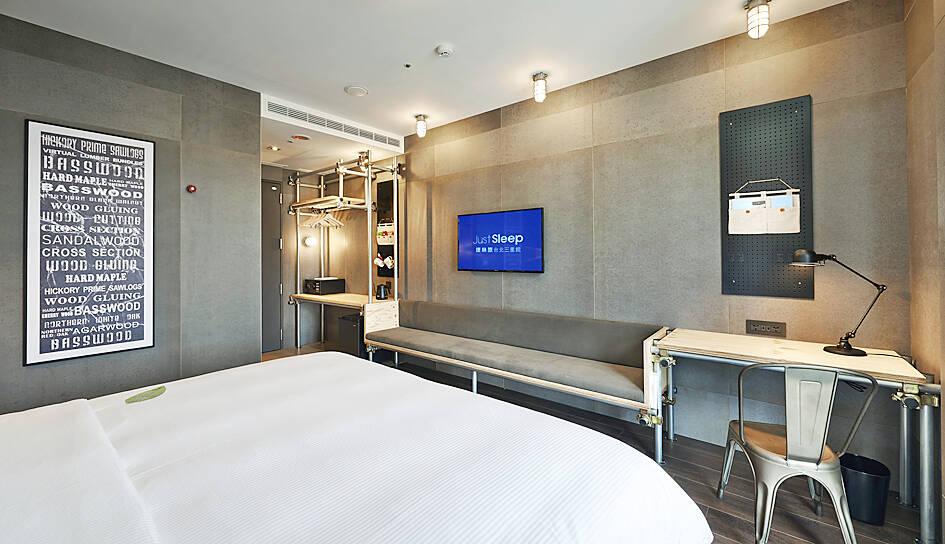The average daily rate of licensed tourist hotels in Taiwan was NT$4,618 (US$145) in the first half of this year, up 14.14 percent from the same period last year, according to the statistics released by the Tourism Bureau on Wednesday.
The statistics show that prices at registered "general hotels," which do not require a tourist hotel license, averaged US$2,647 per night in the first six months this year, up 8.1 percent from a year earlier, while the prices of B&Bs averaged NT$2,536, up 1.44 percent year-on-year.
The average hotel room price hikes could be attributed in part to soaring raw material prices, the bureau said in a statement.

Photo: CNA
In addition, higher electricity prices also boosted hotel operational costs.
By region, tourist hotels in Nantou County had the highest average prices at NT$15,449 per night, largely due to the presence of hotels targeting high- end customers, such as The Lalu and Fleur de Chine, the bureau said.
In terms of general hotels, Yilan County had the highest average room prices at NT$3,474 per night, the bureau added.
Meanwhile, the number of guests at hotels and other collective accommodation establishments in Taiwan reached 38.08 million in the January-to-June period, which is close to pre-pandemic levels, the bureau added.
The guest number translated into NT$84.84 billion in total business revenue, exceeding the amount in the same period of 2019, the bureau said.

Alain Robert, known as the "French Spider-Man," praised Alex Honnold as exceptionally well-prepared after the US climber completed a free solo ascent of Taipei 101 yesterday. Robert said Honnold's ascent of the 508m-tall skyscraper in just more than one-and-a-half hours without using safety ropes or equipment was a remarkable achievement. "This is my life," he said in an interview conducted in French, adding that he liked the feeling of being "on the edge of danger." The 63-year-old Frenchman climbed Taipei 101 using ropes in December 2004, taking about four hours to reach the top. On a one-to-10 scale of difficulty, Robert said Taipei 101

Nipah virus infection is to be officially listed as a category 5 notifiable infectious disease in Taiwan in March, while clinical treatment guidelines are being formulated, the Centers for Disease Control (CDC) said yesterday. With Nipah infections being reported in other countries and considering its relatively high fatality rate, the centers on Jan. 16 announced that it would be listed as a notifiable infectious disease to bolster the nation’s systematic early warning system and increase public awareness, the CDC said. Bangladesh reported four fatal cases last year in separate districts, with three linked to raw date palm sap consumption, CDC Epidemic Intelligence

US climber Alex Honnold left Taiwan this morning a day after completing a free-solo ascent of Taipei 101, a feat that drew cheers from onlookers and gained widespread international attention. Honnold yesterday scaled the 101-story skyscraper without a rope or safety harness. The climb — the highest urban free-solo ascent ever attempted — took just more than 90 minutes and was streamed live on Netflix. It was covered by major international news outlets including CNN, the New York Times, the Guardian and the Wall Street Journal. As Honnold prepared to leave Taiwan today, he attracted a crowd when he and his wife, Sanni,

Two Taiwanese prosecutors were questioned by Chinese security personnel at their hotel during a trip to China’s Henan Province this month, the Mainland Affairs Council (MAC) said yesterday. The officers had personal information on the prosecutors, including “when they were assigned to their posts, their work locations and job titles,” MAC Deputy Minister and spokesman Liang Wen-chieh (梁文傑) said. On top of asking about their agencies and positions, the officers also questioned the prosecutors about the Cross-Strait Joint Crime-Fighting and Judicial Mutual Assistance Agreement, a pact that serves as the framework for Taiwan-China cooperation on combating crime and providing judicial assistance, Liang